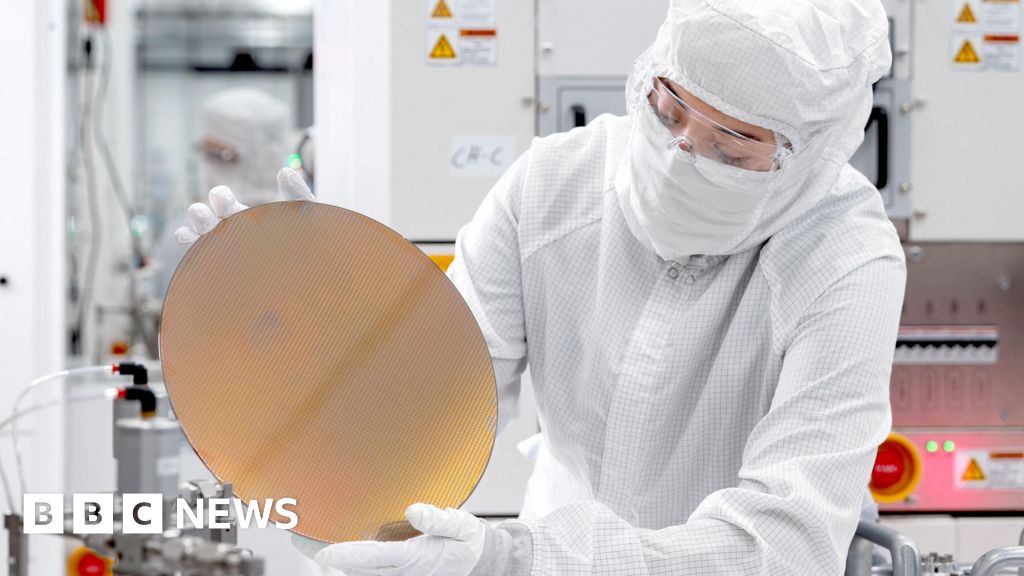Technology giant Texas Instruments (TI) will invest more than $60bn (£44.74bn) in the US, as President Donald Trump pressures big computer chip makers to increase manufacturing in the country. The company said it plans to build or expand seven chip-making facilities at three sites in Texas and Utah, and create 60,000 jobs. TI did not give a detailed timeline for the investment. The Dallas-based firm described the move as the "largest investment in foundational semiconductor manufacturing in US history." It follows similar announcements from others manufacturing semiconductors, including Micron, which said last week that it would increase its planned spending in the US to $200bn. "President Trump has made it a priority to increase semiconductor manufacturing in America," US Secretary of Commerce Howard Lutnick,said in a statement on Wednesday. "Our partnership with TI will support US chip manufacturing for decades to come." Like some other companies that unveiled major spending pledges, TI's announcement includes money already earmarked to either build or expand facilities. Some analysts said they see such major spending announcements as attempts to placate Trump. The president repeatedly threatened to cancel the $52.7bn CHIPS and Science Act, which was introduced by his predecessor, Joe Biden. In December, the Biden administration finalised a $1.6bn subsidy for TI after it announced plans to invest at least $18bn to build three new facilities. Trump also warned of potential new tariffs on imports of semiconductors. Unlike artificial intelligence chip companies like Nvidia, Texas Instruments makes so-called foundational chips, which are used in various devices, including smartphones and cars. The company operates 15 sites around the world, including facilities in the US and Asia. It counts iPhone-maker Apple, Elon Musk's rocket firm SpaceX and motor industry giant Ford amongst its customers. Texas Instruments has faced increasing competition from Chinese manufacturers of these lower-end chips.
Texas Instruments to make 'historic' $60bn US chip investment
TruthLens AI Suggested Headline:
"Texas Instruments Announces $60 Billion Investment in U.S. Chip Manufacturing"
TruthLens AI Summary
Texas Instruments (TI), a prominent player in the semiconductor industry, has announced an ambitious investment exceeding $60 billion in the United States. This substantial financial commitment comes as part of a broader push by the Trump administration to enhance domestic semiconductor manufacturing capabilities. TI plans to construct or expand seven chip production facilities across three locations in Texas and Utah, which is expected to generate approximately 60,000 new jobs. The company has characterized this investment as the largest in foundational semiconductor manufacturing in U.S. history, underscoring its significance in the current economic landscape. The announcement aligns with a trend observed among other firms in the semiconductor sector, such as Micron, which recently revealed plans to increase its investment in U.S. manufacturing to $200 billion. This collective movement reflects the growing emphasis on domestic production in light of supply chain vulnerabilities exposed by global events.
Further context around TI's investment reveals that it is not merely a new influx of capital but also includes previously allocated funds for facility expansions. Analysts suggest that such declarations of major financial commitments may also serve as strategic responses to political pressures, particularly from President Trump, who has consistently advocated for bolstering the semiconductor industry within the U.S. market. The administration has previously threatened to reconsider the $52.7 billion CHIPS and Science Act, which was established under President Biden. In December, the Biden administration approved a $1.6 billion subsidy for TI, reinforcing the company's plans to invest at least $18 billion in the construction of new facilities. Unlike companies that focus on advanced AI chips, TI specializes in foundational chips that are integral to a wide array of devices, from smartphones to vehicles, and faces increasing competition from Chinese manufacturers in this segment. TI's customer base includes major corporations such as Apple, SpaceX, and Ford, highlighting its pivotal role in the global technology ecosystem.
TruthLens AI Analysis
You need to be a member to generate the AI analysis for this article.
Log In to Generate AnalysisNot a member yet? Register for free.
